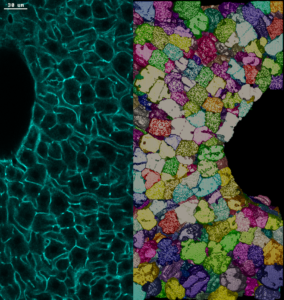
Molecular Cell Biology
Molecular Cell Biology aims to explore the molecular basis of biological processes using diverse methods and perspectives, from standard molecular techniques to biochemical reconstitution and biophysical manipulation, across various scales – from molecules to cells and tissues, with the cell at the core. This field spans biology, physics, and bioengineering, acting as a thematic “glue” among existing research areas and a “bridge” between areas such as Structural Biology and Genomics.
This discipline is crucial in medicine, genetics, evolutionary biology, bioinformatics, genome engineering, and genomics. For example, it is fundamental in medical DNA analysis, drug discovery, tissue growth and transplantation, and other health-related areas. It advances our understanding of cellular functions, including anatomy, growth, migration, survival, and death, along with their molecular mechanisms in human health and disease.
This programme will combine microscopy imaging and computational methods to develop models of human tissues in health and disease, involving mathematical and biophysical models and leveraging omics, computer science, and physics. Collaboration with clinicians in the Milan area will be a crucial aspect.
Research groups
-
Zerial Group
The Zerial Group studies endocytosis – the process by which cells absorb substances from the extracellular milieu by engulfing them into vesicles. Our research crosses biological scales and disciplines to decipher protein interactions within the endosomal fusion machinery, define the processes that establish hepatocyte polarity and understand the biophysics of liver tissue formation.

